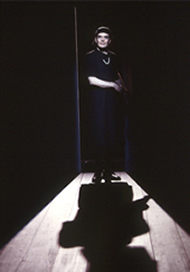 On
Being a Museum
On
Being a Museum
By Robert Brustein
I Am My Own Wife
By Doug Wright
Playwrights Horizons
416 W. 42nd St.
Box office: (212) 279-4200
At Playwrights Horizons, Doug Wright (the
author of Quills), Jefferson Mays (an actor trained with
Ann Bogart's SITI Company), and Moisés Kaufman (the director of
Gross Indecency and The Laramie Project), have
all collaborated on a most remarkable piece of political theater
called I Am My Own Wife. Based on the life of an actual
German transvestite living in East Berlin named Charlotte von
Mahlsdorf (born Lothar Berfelde), the play and performance are
an extraordinary stroke of theatrical transformation, unquestionably
one of the most mesmerizing events of recent seasons.
All that appear at first on Derek McLane's
equally transformative set are a grey wooden floor, a facade decorated
with tasteless wallpaper, a table, and a wooden chest. A woman
enters, wearing a nondescript black dress, orthopedic shoes, and
beaded necklace, smiles, begins to speak, disappears and returns
toting an old RCA Victor gramophone. She then starts to deliver,
in a thick German accent, a learned account of Thomas Alva Edison
and "His Master's Voice" ("the most famous trademark in the world")
as she places a wax cylinder on the machine and lets it graze
the record, producing tinny strains of 1920s jazz.
This woman is Charlotte von Mahlsdorf,
and Wright's dialogue is drawn from a number of interviews and
letter exchanges the author had with her from the summer of 1992
until her death in 2002. Indeed, Wright, the author, soon makes
an appearance on stage, a very gay Southerner also played by Jefferson
Mays, who impersonates about 40 characters in all--adults and
children, men and women, gays and straights--not to mention such
sound effects as an audiotape rewinding. The sense that the play
is being written and researched the moment it is being performed
lends a certain Pirandellian urgency to the evening. And its political
and historical power is provided by a trip through German history
in the second half of the 20th Century, as Charlotte endures the
dangers and humiliations of being a transvestite under both Nazism
and Communism.
She and the rest of the gay community,
like European Jews, are the natural victims of right-wing and
left-wing German totalitarianism. And the play, in part, is an
account of how she "navigated between the two most repressive
regimes the world has ever known." But this is not just an exercise
in victimology. After a childhood in which she comes under the
influence of a lesbian aunt, and later confronts, and possibly
murders her brutal father with a rolling pin, Charlotte ends up
as a custodian of antique furniture and gimcracks such as old
gramophones, grandfather clocks, and miniature armoires, a symphony
of junk beautifully played on McClane's artfully littered set.
"She doesn't run a museum," remarks the
author's macho friend, John Marks, "she is a museum." And before
long, it is clear that all of recent German history resides in
this retiring figure. Brecht and Dietrich sat at her table. Most
of East Berlin's homosexuals, hounded by the police, found community
in her house. And when the Berlin Wall finally falls, she is awarded
the Medal of Honor by a grateful nation.
But Charlotte's past is not without stain.
She was an informer for the Stasi, and was probably responsible
for the imprisonment of another collector, a male homosexual named
Alfred Kirschner. (In defense, Charlotte claims that Kirschner
urged her to name his name since he was doomed to be caught anyway.)
Her credibility under question, threatened now by skinheads rather
than by Nazis or Communists ("I have met you before," she murmurs),
Charlotte ends her days "in a garden of gramophone horns." The
last message Wright receives from her is a photograph a ten-year-old
boy, Charlotte as a child, flanked by two tiger cubs poised either
to lick or eat their human companion (the audience passes a blowup
of the photo in the lobby as it leaves).
As an acting performance, the evening is
an electrifying tour de force, its direction is stagecraft of
the most exemplary and seamless kind, its writing is spare, elusive,
and highly literate. The author can sometimes sound a little frivolous
("Hi, I'm Doug Wright and I'm wearing lace panties"). But like
Tony Kushner, he has found a way to use his gay identity as a
universal criticism of life.
